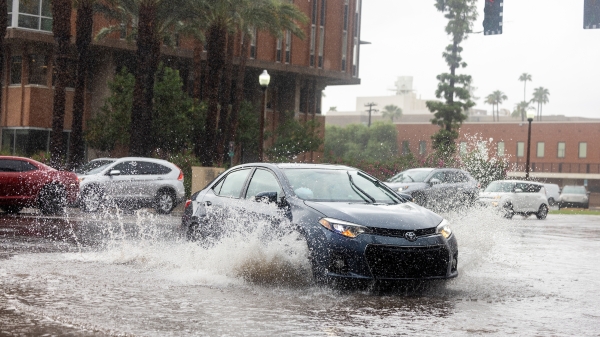OpenCitizen Gathering brings together thinkers to solve complex problems

The first-ever OpenCitizen Gathering, held this month, brought together an exciting group of thinkers and doers to explore a common challenge: how to enable community-based teams to problem-solve in today's complex world.
Over the course of the weekend, OpenCitizen Project — a partnership between the ASU Interplanetary Initiative, ASU Learning Enterprise and Beagle Learning — shared tools meant to inspire participants to make change in their communities, including the five-step OpenCitizen problem-solving process.
“We envision a world of problem-solvers, people supported to identify and take action on the issues in their own communities, and the OpenCitizen Project offers processes and structures that allow any person or group to do just that,” said Lindy Elkins-Tanton, vice president of the ASU Interplanetary Initiative, co-founder of Beagle Learning and principal investigator of NASA’s Psyche mission.
Participants at the Nov. 12–14 event got the chance to practice the OpenCitizen methodology for learning and taking action. To start, they brainstormed big questions that fell under three themes: environment and climate change; the future of learning; and diversity, equity and inclusion.
Organizers distilled their questions into eight ideas that teams then spent the weekend researching and discussing. Participants went between doing individual research and bringing the information back to their groups to discuss what everyone learned and how it could contribute to a solution to their question.
“Everyone here was committed to making and seeing dramatic change in our time in the way people learn, in the way people attack huge thorny problems like climate and equity and diversity, and in how we value each other and value the world we inhabit. The energy alone here actually convinces me that we’re going to be able to do this,” said Christopher Brownell from Fresno Pacific University.
People who take part in the process will eventually be able to earn credit for doing so as long as they achieve certain milestones.
"Everyone has something they want to do — a problem to solve. We think each person deserves to be recognized for the learning they do as they solve their community's real problems. The OpenCitizen Project is helping people solve problems and then offering them college credit for the skills they learn along the way," said Turner Bohlen, co-founder of Beagle Learning.
The problem-solving was punctuated with a series of speakers. Thirteen organizers and invited speakers presented on topics like "Cultivating Growth Mindset Through Feedback and Practice" and how to reinvent the hackathon to support community problem-solvers. The presentations served as another opportunity for collaboration, with presenters often asking the group to break up into smaller teams to contemplate the topic of the presentation.
The event took place at Arcosanti, a unique location chosen to give the event a feeling of retreat, reflection and creativity. Cozy, outdoor spaces provided an environment for casual conversations and independent research before participants rejoined their groups. The venue’s amphitheater was an inviting architectural space for engaging talks and interactive presentations. Later in the night, the stage gave way to making s’mores around the firepits. The tents where participants rested at the end of long days of ideation extended community bonding.
For many participants, this was the first time they’ve been able to connect with like-minded people in nearly two years.
"When you sit alone in the midst of the pandemic, you can despair, and you look around and read the news and you see the polarization in society, and then you come and sit with people who are confident that we’re going to get past that, we’re going to make things better. You start to believe it can actually happen again,” said Brownell.
The weekend was an inspiring jumping-off point for action, and that’s what energized participants about making change in the future. The last thing they did on Sunday was form an action plan with realistic steps they could take to accomplish whatever plan they decided to enact.
“I came here saying that I have all these ideas and I don’t know how to implement them and I don’t know where to start, but I’m leaving here with at least a starting block, which is incredible,” said Mary Brooks, a seventh grade English language arts teacher in Knoxville, Tennessee.
OpenCitizen is already planning for the next gathering. If you or your team would value a dedicated time to consider your big goals and learn the latest methods for collaborative problem-solving, reach out to the team at [email protected].
Top photo: OpenCitizen Gathering participant Josh Thompson presents his ideas to the group.
More Environment and sustainability

From insects to mammals, the ASU Biocollections have it all — and are growing
Hojun Song has dedicated over two decades to studying locusts, grasshoppers, crickets and katydids — those jumping insects that most people would struggle to tell apart. But as the new director of…

How small behavior changes can make a big impact on food waste
Chris Wharton has spent the last 18 years researching diet and sustainability-related behavior changes. To some, the topics may seem unrelated, but to Wharton, a professor at Arizona State University…

Exploring the trickle-down effects of Arizona's fall storms
When rare bursts of rain sweep across the Valley, Arizonans can’t help but revel in the sound of thunder, the smell of wet creosote and the temporary relief from the heat. But while a soaking…





